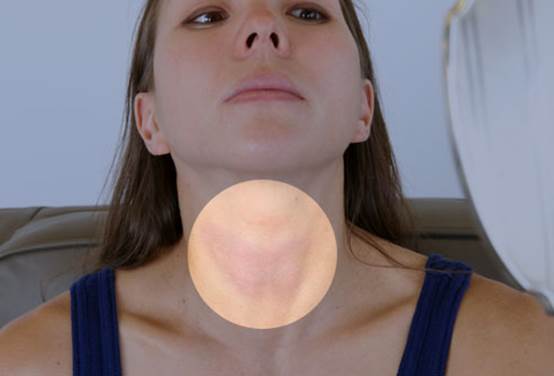If you visit the doctor and are
unhappy with the outcome, trust your instincts and seek a second or even third
opinion
For many people, choosing to consult a
second doctor or specialist on a health matter can turn out to be the difference
between life and death. We spoke to three women who changed the course of their
medical treatment for the better by seeking a second, third, and even fourth
opinion.
Celeste Maddocks, 41 - Copywriter
When I was 27, I found a lump above my
right collarbone. I remember thinking, that’s really odd.’ I decided to get it
checked out. So I went to my local women's health practice and saw a really
good, young doctor who felt the lump and promptly gave me a referral to a
specialist. She said, "There's a possibility that this could be cancer.
There are certain types that happen around your age."

A
lump above my right collarbone
My first thought was, 'Are you Insane? As
if I have cancer!' But I went to see the specialist anyway. He examined the
lump and was a bit dismissive, saying, "These things happen. You can just
get lumps. But we’ll do a biopsy and we’ll see."
I had the biopsy, as well as a chest X-ray
arid a blood test, and then went back to see him. He told me that nothing had
shown up in any of the tests, and that I had nothing to worry about.
About six months later, another lump
appeared on the opposite side. I went back to show the specialist and this time
he grew extremely impatient. He said, "Look, we've done the biopsy and
nothing’s showing up. So just go home."
Then, a couple of months later I discovered
a third lump. I remember this horrible feeling washed over me as I thought,
'There is something really wrong with me.' During all this time,
I’d been seeing a Chinese herbalist. My then-husband and I were trying to
conceive, and she was helping me with herbs and acupuncture. Every time I saw
her, she'd say, "I know you're here to work on your pregnancy, but there's
something blocking you around your chest that we need to dissolve."
That's when I started to do some research.
Some sources I found indicated that the lump could be a lymphoma. I found that
the only way you can diagnose Hodgkin's and non-Hodgkin’s lymphoma which are
both a type of blood cancer is to remove the lump, slice it in half and examine
the cells.
So I got a referral to a surgeon and
when I woke up after the surgery, he told me it looked like cancer. And I
just lay there thinking, 'Thank God' because I knew there was something very
wrong with me.
I had a 10 X 10cm tumor in my upper chest,
and three tumors in my neck, which turned out to be Hodgkin's lymphoma. I was
at stage 2A. It goes up to stage 4 so I caught it halfway. If it hadn't been
for the Chinese herbalist, I might have died.
Finally, I saw a fantastic doctor at St
Vincent's Hospital in Sydney. I had four months of chemotherapy and one month
of radiation. That was 13 years ago. Everything's been good. If the cancer
doesn't return after five years, you're considered to be in remission. But I
still have a check-up every year.
Caroline Roessler, 51 -
Editor/Journalist
Strange things started happening to my body
when I was in my mid-40s. I had heart palpitations, intense heat intolerance,
itchy skin, high anxiety and I was losing weight at a rapid rate. I put that
down to the considerable amount of exercise I was doing, but I was also eating
a lot. Nothing would satisfy me.
My period had also stopped and mentally I
was a bit scattered. And I was shaking all the time, particularly if I was a
bit stressed. Sometimes it was impossible to hold a glass of water without
spilling it.

Heart
palpitations
I went to see my GP and she said,
"Given your age, I think you're probably in perimenopause." She wrote
me a prescription for Cipramil, an anti-anxiety medication. There were no blood
tests done, which, in retrospect, I find quite incredible.
I started taking the Cipramil and, while it
did ease my anxiety symptoms, it had no effect on the others. I put up with it
though, because I thought, 'Well, this is perimenopause - it's hell on earth,
but there's not a lot I can do.'
Then nearly a year later, I started to get
serious heart palpitations and my weight was also really coming down. My
partner kept saying, "There's something seriously wrong with you - this is
not normal." So I went to see another doctor, who did do blood tests, and
it turns out I had Graves disease.
Graves is an autoimmune disease that can
cause hyperthyroidism, so everything in your body speeds up to a million miles
an hour. And because mine was so severe, I was close to having a heart attack.
My heart rate was unbelievably fast and my blood pressure was through the roof.
My lungs were actually starting to fill up because of the stress on my heart.
It could have been lethal.
Straightaway I was put on a course of
Neo-Mercazole, a drug commonly used to treat Graves disease, as well as beta
blockers to bring my heart rate down. For a time I had an irregular heartbeat,
which developed because of the stress on my heart from the hyperthyroidism. The
new doctor also put me onto an endocrinologist and he was fantastic. He started
to manage it.
Even though my heart got back to a normal
rhythm, I was still coping with the other symptoms. My doctor took another
blood test and tested for perimenopause. She put me on bio-identical hormone
therapy, which started to make me feel really strange and seemed to exacerbate
the itchy skin.
So I went to see a third doctor whom I’d
heard incredibly good things about from friends. The first thing she did was
take me off the bio-Identical hormones and wean me off Cipramil. Her treatment,
as well as my endocrinologist's, put me on the right path.
I decided to have radioactive iodine
therapy on my thyroid in late 2011 and now I have to be on thyroxine for the
rest of my life, but that's easy to manage. Finally, I feel like my body's
recalibrated, it was a long road until I found the right doctor who took a
holistic look at my life and finally got it sorted.
Racheliabirch-Samios, 37 - Events
Manager
I'd been having continual problems with
my gut for ages - after getting sick while travelling in India and my GP gave
me a diagnosis of irritable bowel syndrome (IBS). I decided to see a new GP,
who sent me for blood tests. He discovered that I had a stomach bug called
Giardia as well as a stomach bacteria that causes ulcers.
So he said to me, "Okay, we've got to
deal with one thing at a time." He gave me strong antibiotics to get rid
of the Giardia and said he wanted me to take an antacid at the same time. He
said, "I’ll get you a second round of tests after you've finished the
antibiotics and we’ll see if we have to give you a second round for the
ulcer."
The antibiotics knocked me around a lot. I
was also concerned he wanted to give me a second round back-to- back, without
doing anything to restore my body in-between. I told my mum about it and she
was concerned about the antacids he'd prescribed for me as well - they were
highly chemical and known to have really adverse reactions.

Irritable
bowel syndrome (IBS)
At this point I decided that instead of
taking the antacid I’d go and see my naturopath. I figured I had nothing to
lose because I was going back to get another test from the GP anyway and if the
naturopath's treatment didn't work, then I'd just go with the second course of antibiotics.
I showed my naturopath the GP's test
results and she said, "I think we can give you natural remedies that will
kill the bacteria and heal the body without you having to use those
chemicals."
She prescribed a bunch of natural remedies
that target 'bad' bacteria: garlic tablets, apple cider vinegar and coconut
oil. I took all of that for about two weeks and continued with the antibiotics
to finish the course. Then I started on what she called the "healing
component" of the treatment - slippery elm bark, multivitamins and
probiotics to balance out the antibiotics.
I saw my GP for the second round of tests
and the results showed the naturopath's treatment had worked, but I didn't tell
him. I know he's vehemently anti-naturopathy.
I believe that GPs and naturopaths both
have a role to play I think that sometimes GPs are too rushed and their
thinking can be too narrow. Naturopaths are really good for that holistic
approach.
If I've got a problem now, I make an
appointment with both and present my symptoms. I always go to the GP first to
have any tests, then to my naturopath to show her the test result and to see if
she's got anything more to add.